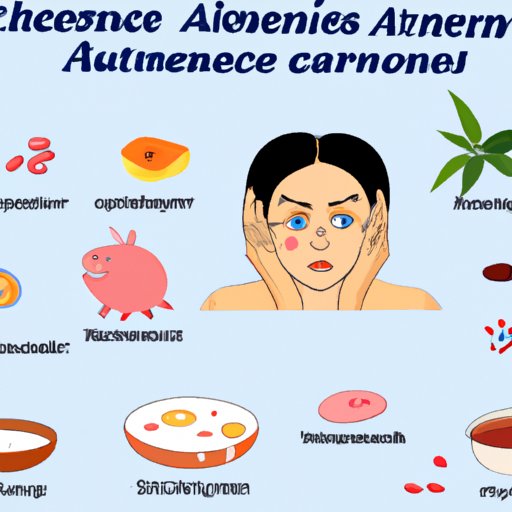Introduction
Hormonal acne is a common condition that affects millions of people, particularly those in their teenage years and twenties. It is characterized by breakouts of pimples, blackheads, and cysts that are often painful or itchy. Hormonal acne can be difficult to manage and may require lifestyle changes and medical treatments to control. In this article, we will explore what helps hormonal acne, including identifying the causes, exploring diet and nutrition, looking at natural remedies, examining skincare products, and consulting a professional.

Identifying the Causes of Hormonal Acne
The underlying cause of hormonal acne is an imbalance of hormones in the body. This can be due to puberty, pregnancy, menopause, or other hormonal imbalances. Genetics also play a role, as certain genetic predispositions can make someone more susceptible to hormonal acne. Finally, stress can trigger or worsen hormonal acne, as it disrupts the body’s natural balance of hormones.
Understanding the Role of Stress in Hormonal Acne
Stress has a significant impact on skin health. When the body is under stress, it releases a hormone called cortisol, which can lead to increased oil production and clogged pores. Additionally, stress can cause inflammation, which can worsen existing acne. To reduce stress, it is important to practice relaxation techniques such as yoga, meditation, and deep breathing. Additionally, getting enough sleep and regular exercise can help reduce stress levels.

Exploring Diet and Nutrition to Combat Hormonal Acne
Diet and nutrition are key components of managing hormonal acne. Eating a balanced diet with plenty of fresh fruits, vegetables, whole grains, lean proteins, and healthy fats can help reduce breakouts. It is also important to avoid processed foods and sugary snacks, as these can increase inflammation and worsen acne. Additionally, drinking plenty of water and staying hydrated can help keep the skin clear and healthy.
Looking at Natural Remedies for Hormonal Acne
Natural remedies can be effective for treating hormonal acne. Herbal teas such as chamomile, peppermint, and green tea can help reduce inflammation and soothe irritated skin. Essential oils like tea tree and lavender can also help reduce inflammation and kill bacteria. Additionally, honey masks can help moisturize the skin and reduce inflammation. Be sure to test any natural remedy on a small area of skin before applying it to the entire face.
Examining Skincare Products for Treating Hormonal Acne
There are many over-the-counter skincare products available for treating hormonal acne. These include cleansers, exfoliants, spot treatments, and moisturizers specifically formulated for acne-prone skin. Additionally, there are professional-grade products available from dermatologists or aestheticians that may be more effective than over-the-counter products. These products typically contain potent ingredients such as salicylic acid and benzoyl peroxide that can help reduce breakouts.

Consulting a Professional for Further Treatment
For severe cases of hormonal acne, it is best to consult a professional. Dermatologists and aestheticians can provide personalized treatment plans that may include medications, laser treatments, and chemical peels. Additionally, they can provide advice on lifestyle changes and skincare regimens that may help reduce breakouts. Consulting a professional can also help identify any underlying conditions that may be causing the acne.
Conclusion
Hormonal acne can be a difficult condition to manage, but understanding its causes and exploring treatment options can help reduce breakouts. Identifying triggers such as hormones, genetics, and stress can help pinpoint the root of the problem. Incorporating dietary changes, natural remedies, and professional-grade skincare products into a skincare regimen can also help reduce and prevent breakouts. For more severe cases of hormonal acne, consulting a professional for further treatment and advice is recommended.


